Key takeaways:
- Inclusive curriculums enhance student engagement and performance by reflecting diverse experiences and perspectives.
- Pro-life advocacy emphasizes the inherent value of life and the importance of supporting women in challenging circumstances.
- Curriculums influence students’ understanding of life and its complexities, necessitating a balanced presentation of pro-life and pro-choice perspectives.
- Incorporating real-life narratives and diverse materials fosters empathy and critical thinking in students about significant life issues.
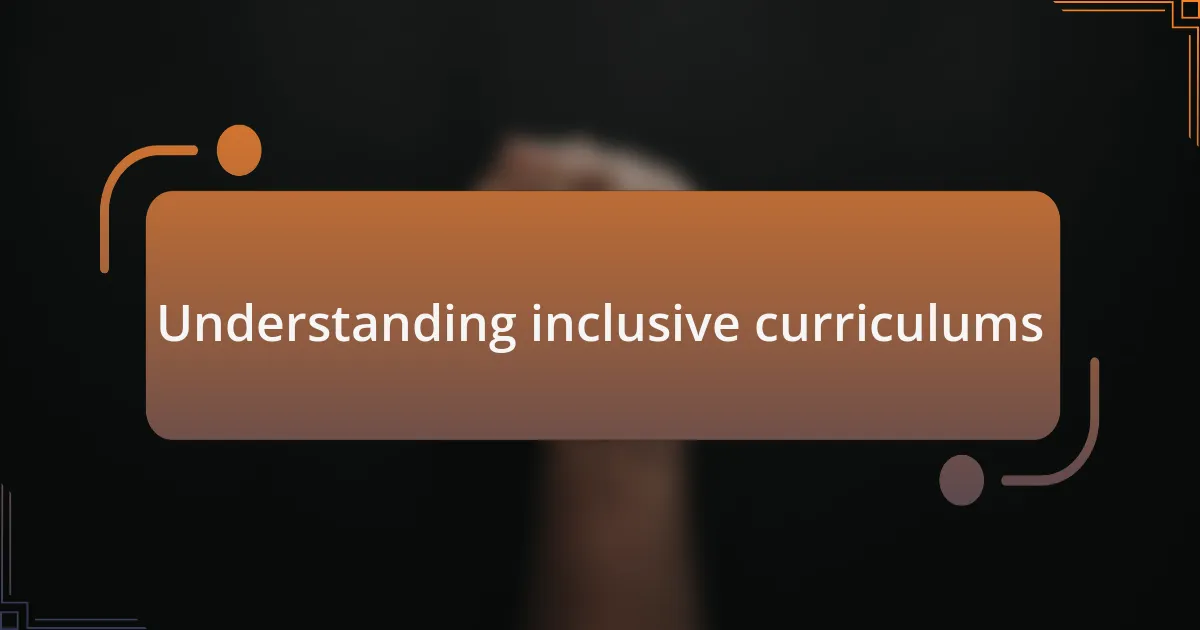
Understanding inclusive curriculums
Inclusive curriculums aim to reflect the diverse experiences, perspectives, and backgrounds of all students. I remember a time when I was part of a discussion group that explored different cultural perspectives in education. It struck me how much richer the dialogue became when we included voices that were traditionally marginalized. It left me wondering: how many important stories and lessons are missing when we overlook certain viewpoints?
Understanding inclusive curriculums also means recognizing that education should be a place where every student feels seen and valued. I once volunteered in a classroom where students shared their own family stories, and it was profound to witness their pride and excitement. This dynamic made me realize that when students see themselves in their lessons, their engagement and academic performance often soar. Doesn’t it make you think about the transformative power of feeling represented in the learning process?
Moreover, inclusive curriculums aren’t just about textbooks; they encompass teaching styles, classroom discussions, and the very environment where learning occurs. I once attended a workshop focused on inclusive teaching methods, and it opened my eyes to the myriad ways we can accommodate different learning needs and styles. Isn’t it fascinating how small adjustments, like group activities or varied resources, can create an atmosphere where every student thrives?
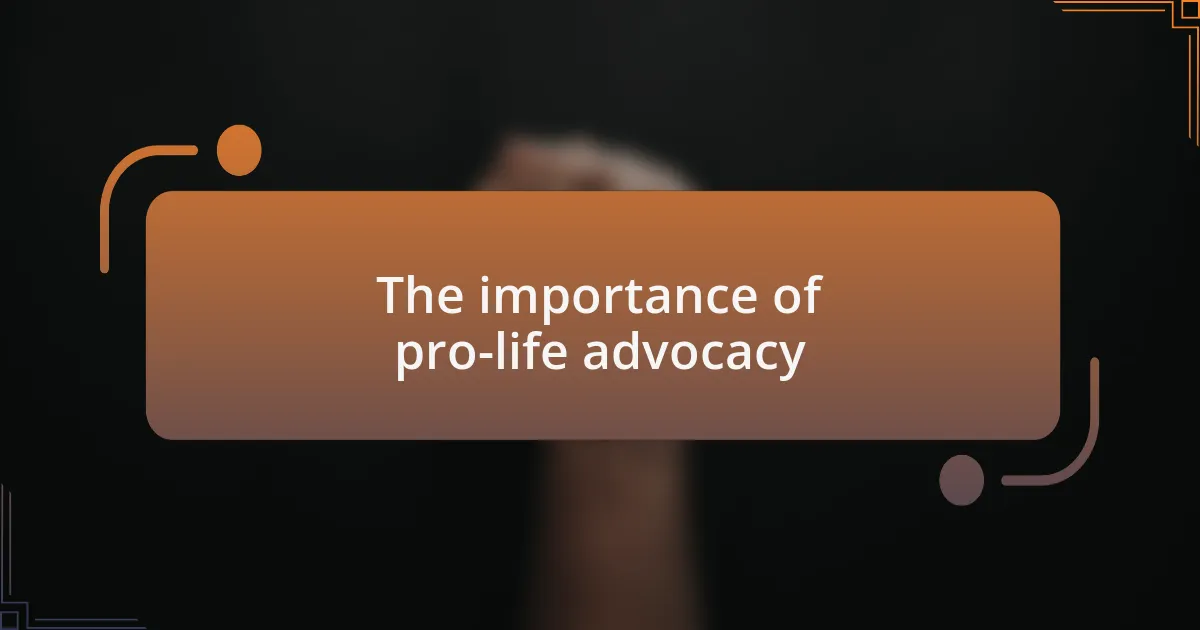
The importance of pro-life advocacy
Pro-life advocacy is vital because it champions the inherent value of every human life. I once attended a local rally where advocates shared stories of individuals who faced challenging circumstances but ultimately chose life. Hearing those narratives moved me deeply and made me realize how crucial it is to support women facing these tough choices, ensuring they know they are not alone.
In advocating for pro-life principles, we also address the broader societal implications of valuing life. I remember discussing with a friend how cultures that prioritize life often foster increased community support and social stability. It left me wondering: what kind of world could we build if we collectively embraced a culture of life where every person is seen as worthy of protection and love?
Furthermore, pro-life advocacy serves as a call to action to create comprehensive support systems for mothers and children. I think back to a program I volunteered with, which provided resources for expectant mothers, helping them navigate all sorts of challenges, from healthcare to parenting classes. When we invest in such initiatives, we send a powerful message: that life is precious and worthy of support, relief, and encouragement at every stage. What could be more important than standing up for those who cannot stand up for themselves?
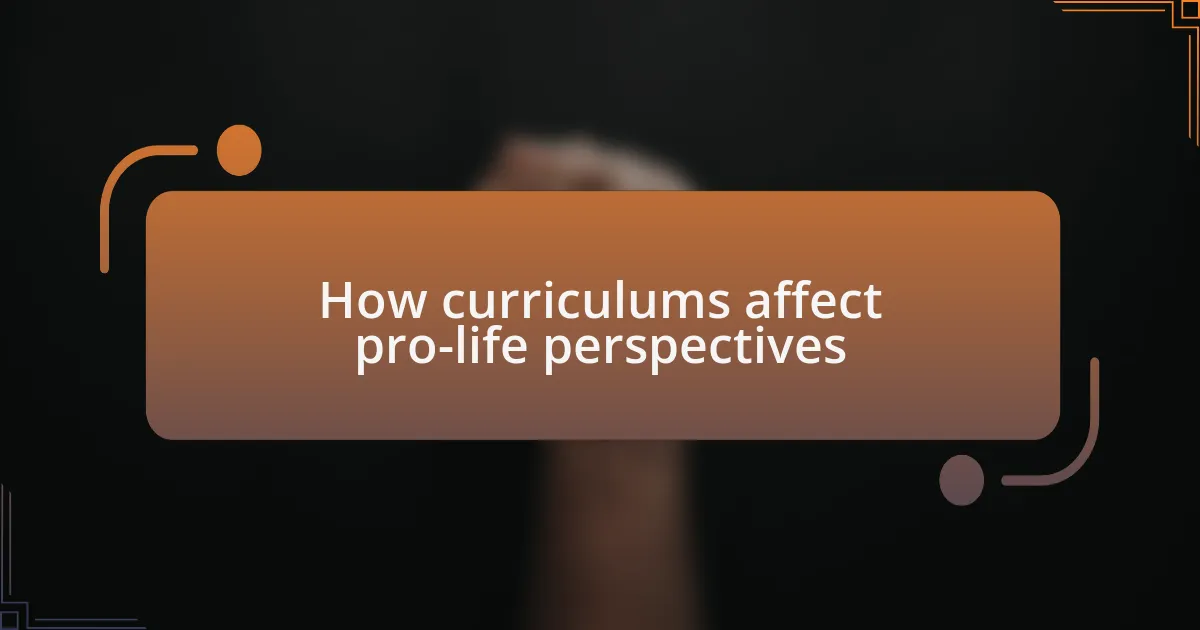
How curriculums affect pro-life perspectives
Curriculums play a significant role in shaping how young minds perceive life and its value. I recall a discussion I had in a high school class where the topic of reproductive rights was presented, often without the nuanced context of the pro-life perspective. Sitting there, I realized that without a balanced view, students might miss crucial insights about the sanctity of life and the emotional complexities surrounding it.
Through my experiences, I’ve come to see how educational materials can either uplift or undermine pro-life principles. For instance, I found it eye-opening when a friend shared their experience from a university course that only highlighted the pro-choice narrative. How are students meant to form well-rounded opinions if they aren’t exposed to both sides? Including diverse perspectives, particularly on issues surrounding life, can foster a more compassionate and informed dialogue.
Moreover, integrating pro-life themes into curriculums can significantly influence societal values. I once volunteered for a community program that collaborated with local schools to provide information on the resources available for pregnant teens. I vividly remember the gratitude expressed by educators when they saw how this information enriched their discussions. Isn’t it imperative that we equip the next generation with a fuller understanding of life’s complexities? By doing so, we cultivate a culture that appreciates and defends the inherent value of every individual.
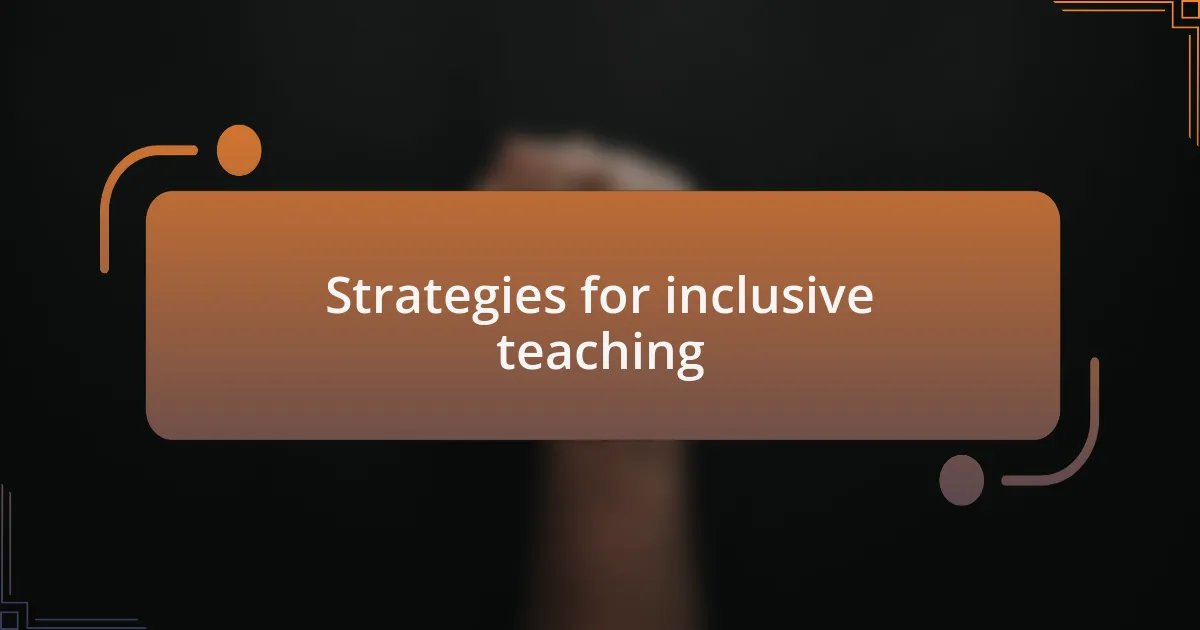
Strategies for inclusive teaching
In fostering an inclusive teaching environment, one effective strategy is to actively engage students in dialogues that encourage them to explore various viewpoints. I remember a workshop I attended where facilitators prompted us to share our thoughts about controversial topics, treating each perspective with respect and curiosity. This approach not only helped me appreciate differing opinions but also encouraged empathy and understanding among peers. Isn’t it fascinating how open conversation can illuminate the underlying values behind each viewpoint?
Another strategy revolves around incorporating real-life narratives into the curriculum. During my time volunteering with a pregnancy support organization, I witnessed firsthand how powerful personal stories can be in shaping attitudes. By integrating testimonials from individuals who have navigated complex life choices, educators allow students to relate on a human level. This can be a game-changer, as it humanizes often abstract concepts, making the discussions about life much more relatable and emotionally resonant.
Additionally, it’s crucial to utilize diverse teaching materials that reflect a variety of cultural and moral perspectives. I recall working on a project where we examined case studies from various ethical frameworks, which opened my eyes to how cultural context influences our beliefs about life. By providing students with a rich array of resources, educators can foster critical thinking and dialogue. How can we expect the next generation to engage thoughtfully with profound issues if they don’t encounter the full spectrum of perspectives available?
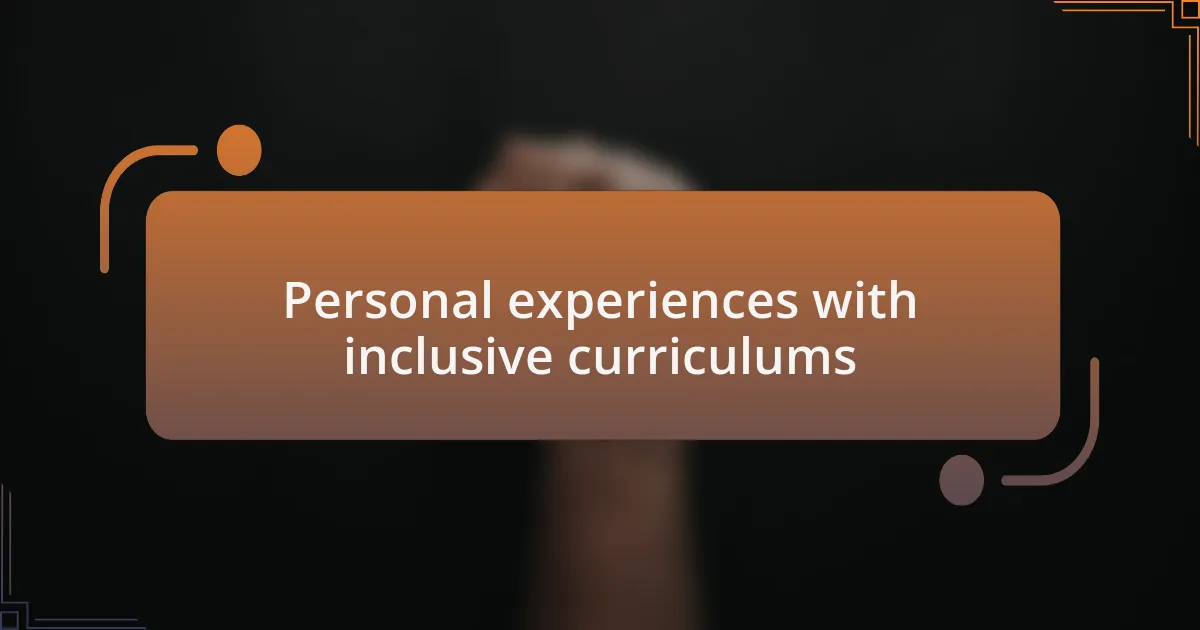
Personal experiences with inclusive curriculums
Reflecting on my personal experiences with inclusive curriculums, one instance that stands out is a high school history class that focused on pivotal figures from diverse backgrounds. The lesson not only highlighted famous leaders but also included local activists whose stories often go untold. I felt a surge of pride as I recognized familiar names and stories that resonated with my community, illustrating that history is not just a series of events but a tapestry of voices. Isn’t it empowering to see yourself reflected in your education?
During a college workshop on inclusive education, I participated in an activity that challenged us to consider how our identities shape our learning experiences. I remember feeling a mix of vulnerability and revelation as we discussed our backgrounds, values, and the barriers we faced. This dialogue not only fostered a sense of belonging but also ignited curiosity about how others navigate different challenges. I realized that understanding diverse experiences is essential for creating an environment where everyone feels valued and heard.
Additionally, I recall a moment in a curriculum development meeting where we debated the inclusion of unconventional texts. I advocated for a poetry collection that spoke to the struggles of marginalized voices. Initially met with skepticism, the conversation evolved into a rich exchange of ideas about representation in literature. It struck me how important it is to include materials that spark discussions about real-world issues, nurturing empathy and broader perspectives among students. Can we genuinely prepare young minds for the complexities of life without these crucial conversations?
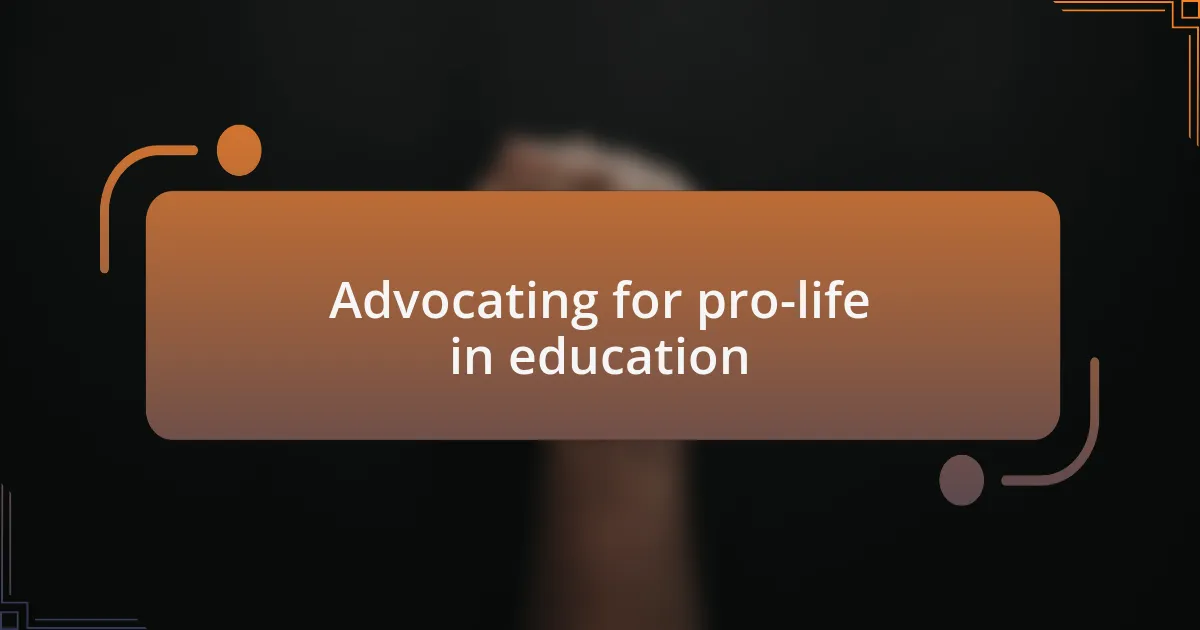
Advocating for pro-life in education
Advocating for pro-life in education is essential in fostering a culture that respects the sanctity of life. I remember attending a seminar where we discussed ways to incorporate pro-life values into the curriculum, and it struck me how vital it is to engage students in conversations about the implications of life choices. How can we expect young individuals to make informed decisions without comprehensive discussions surrounding the value of life?
In my experience, incorporating literature and case studies that reflect pro-life perspectives can be particularly impactful. I once facilitated a discussion around a novel that depicted the challenges faced by pregnant teens, emphasizing the importance of support and understanding. Watching my peers connect deeply with the material underscored how education can be a powerful tool to instill empathy and conviction in pro-life principles. Isn’t it fascinating how stories can shape our views on such profound issues?
Additionally, I’ve seen firsthand how creating inclusive environments where pro-life beliefs are openly discussed can lead to transformative moments for students. During a class debate on reproductive rights, I encouraged students to explore both sides, but I always made sure to highlight the importance of valuing every life. By fostering such dialogues, we equip future generations with the wisdom to appreciate life’s inherent worth. What better way to impart lasting values than through education that champions the sanctity of life at its core?